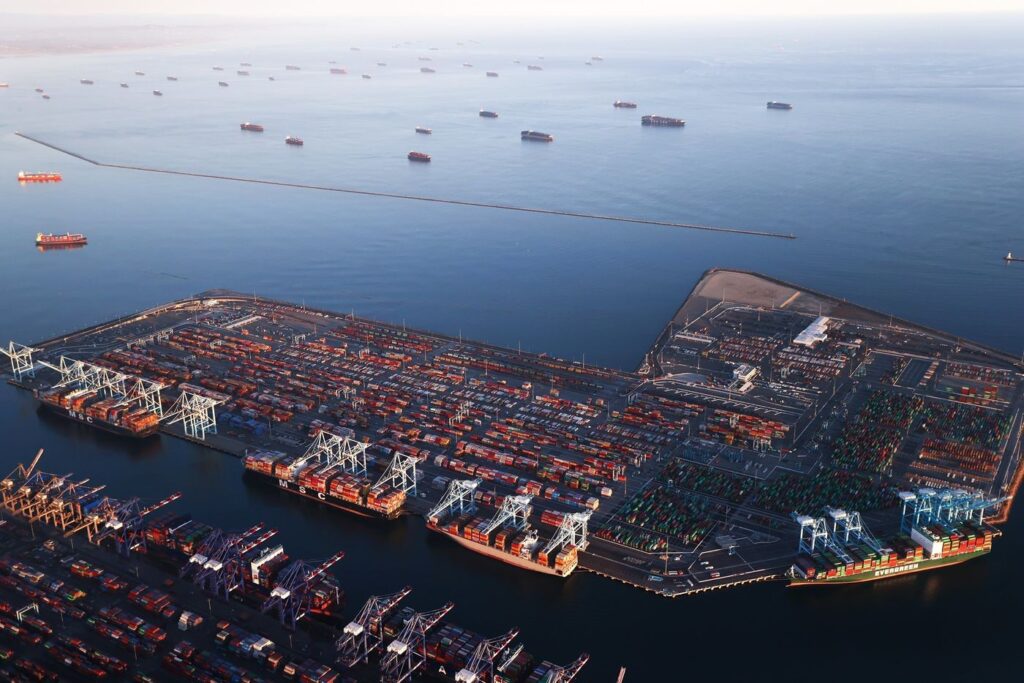Is This Any Way to Run a City’s Schools?
Leaked CTU Proposals Won’t Do Anything to Improve Schools’ Poor Performance

As this Newsletter edition goes to press in late June, a certain measure of relief appears to be in sight at last for our nation’s West Coast ports, which over the course of the past two years have been hit again and again by paralyzing work slowdowns and other related disruptions.
Seeking to gain the upper hand in extended negotiations over a new contract to replace the one that expired on July 1, 2022, the militant hierarchy of the International Longshore Workers Union (ILWU) and its sometimes even more radical followers gummed up ports again and again.
Just before Easter this year, there was a full-on work stoppage.
And once the West Coast’s unionized dockworkers returned to work in mid-April, ILWU radicals reportedly began targeting the small handful of Los Angeles/Long Beach port terminals that have been partially automated against union bosses’ wishes by “red-tagging” cargo-handling equipment there.
As financial writer Scott Lincicome recently explained in his Capitolism newsletter, “red-tagging” is a Big Labor work slowdown tactic in which perfectly safe equipment is maliciously labeled as unsafe, forcing inspection after inspection and bogging operations down.
Of course, ILWU bosses almost never take any responsibility when such slowdowns happen.
Instead, they sit back while the “passive-aggressive behavior” escalates “with increasingly implausible deniability,” as the industry magazine FreightWaves has put it.
But on June 15, hopes rose that the West Coast ports could return to normal soon as ILWU bosses and port operators announced they had reached a tentative deal on a new contract.
By almost any standard, the ILWU rank-and-file were well-paid under the coastal-wide contract that expired last summer, earning an average of more than $200,000 in 2022 with bonuses and overtime included.
Moreover, the Pacific Maritime Association (PMA), which negotiates on behalf of 29 U.S. West Coast ports, was manifestly prepared more than a year ago to increase dockworkers’ pay substantially over the course of the new contract.
Rather than any pay- or bonus-related issue, the key sticking point to forging a new contract was port operators’ and ocean carriers’ desire to use “robots, autonomous vehicles, drones, and other . . . tech to boost container processing efficiency,” as Mr. Lincicome has explained.
Thanks largely to the extraordinary monopoly privileges they wield under federal and California law, ILWU kingpins have up to now been almost entirely successful at blocking the introduction of such new technology.
“Union President Willie Adams and other ILWU bosses claim they oppose automating ports because modernization will reduce the size of the workforce,” noted National Right to Work Committee Vice President Matthew Leen.
“But the experience of ports in other nations and even on the U.S. East Coast that have modernized in ways fiercely opposed by the ILWU brass shows employment is likely to increase, not decrease, as businesses expand.
“The real concern of ILWU chiefs appears to be they won’t be able to exercise iron-clad control over the array of new employees automation could bring to West Coast ports.”
At this writing, the terms of the new PMA/ILWU contract that awaits ratification by West Coast ports’ front-line employees have not been made public.
Consequently, it is unknown to what extent the ILWU succeeded in thwarting the introduction of new technology.
“No matter the exact terms, it’s sadly a safe bet that, ratification or no ratification, America’s West Coast ports will continue to be far less efficient than the vast majority of their First World counterparts over the next five years,” predicted Mr. Leen.
“That means that American farmers who must rely on West Coast ports to get their grains, fruits, vegetables and meat to foreign markets will continue to see their profits slashed by unnecessarily high shipping costs. Manufacturers who need to keep their international customers happy to stay in business will be similarly hurt.
“Of course, the cost of ILWU boss-perpetuated port inefficiency also gets passed on to millions of American families who have to pay billions of dollars more than they otherwise would for necessities like groceries and clothes.
“The ILWU bosses can’t even plausibly claim they’re reaping higher pay for dockworkers. The only people they’re clearly helping are themselves.”
This article was originally published in our monthly newsletter. Go here to access previous newsletter posts.
To support our cause and help end forced unionism, go here to donate.

Leaked CTU Proposals Won’t Do Anything to Improve Schools’ Poor Performance

Wherever Big Labor wields the power to collect forced union dues, union bosses funnel a large share of the confiscated money into efforts to elect and reelect business-bashing politicians. Employment growth tends to lag as a consequence.

Members Insist They Keep Pro-Right to Work Campaign Promises